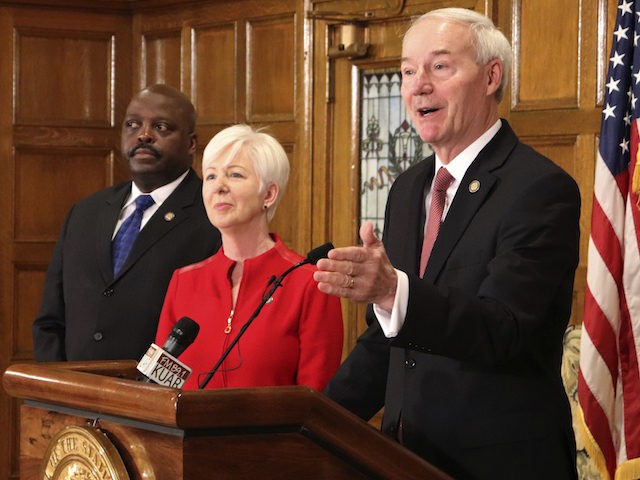Gov. Asa Hutchinson made Arkansas the third state to implement work requirements on Medicaid recipients Monday after the federal government approved its waiver.
Gov. Hutchinson said that the work requirement is “not about punishing anyone.”
“It’s about giving people the opportunity to work. It’s to give them training that they need. It’s to help them move out of poverty and up the economic ladder,” Hutchinson added.
The governor was joined by Centers for Medicare and Medicaid Services (CMS) Administrator Seema Verma.
The Medicaid work requirements would only apply to able-bodied, working-age adults. Americans with disabilities, older Americans, children, and pregnant women would not have to comply with potential Medicaid work stipulations.
Hutchinson also revealed that the waiver from the CMS does not include a reduction of “Medicaid coverage down to 100 percent of the federal poverty level.”
“The administrator has agreed to continue to work with us on that, but we did not want to wait for a full analysis of the entire waiver,” Hutchinson explained.
Gov. Hutchinson argued that his waiver would save roughly $365 million in the fiscal year 2019.
President Donald Trump’s administration issued a guidance in January allowing states to apply for waivers to reform their state Medicaid programs.
Verma, who worked with then-Indiana Gov. Mike Pence to reform that state’s Medicaid program, said, “This gives us a pathway to start approving waivers. This is about helping those individuals rise out of poverty.”
Kentucky became the first state to implement work requirements for Medicaid after the CMS approved its waiver in January. Indiana became the second state to implement its work requirements for Medicaid in February.
A Rassmussen poll in January found that 64 percent of Americans approve of work requirements for Medicaid.
Wisconsin Gov. Scott Walker, another state leader seeking work requirements for Medicaid, said that social safety net programs should lift people up rather than trapping them in a cycle of poverty.
“We should treat public assistance more like a trampoline than a hammock,” Walker explained last May.

COMMENTS
Please let us know if you're having issues with commenting.